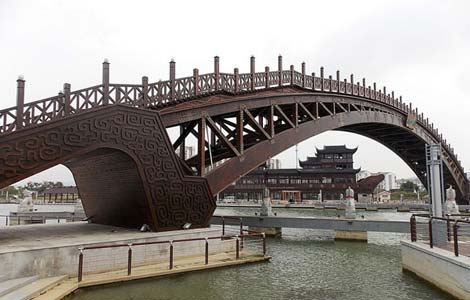

Hebei said it eliminated 4.56 million metric tons of ironmaking capacity and 6.8 million tons of steelmaking capacity in three cities on Sunday, marking the start of the province's campaign to cut excess production capacity.
On Sunday, a total of 10 blast furnaces and 16 basic oxygen furnaces were dismantled in Tangshan, Handan and Chengde, the Xinhua News Agency reported. With the demolition of the facilities, about 2.76 million tons of coal can be saved, and sulfur dioxide emissions will be cut by 9,800 tons.
The State Council, China's cabinet, has set a target to cut 80 million tons of steel production within five years. Hebei - the largest steel production area in the country and one of the most polluted provinces - will cut 60 million tons of steel capacity by the end of 2017. Hebei's steel production capacity is 200 million tons annually, and the province has topped the chart in China for 12 consecutive years.
According to the environmental production authorities of the local government, Hebei plans to cut another 26 million tons of capacity by 2020 in addition to the 60-million-ton reduction by 2017, China Daily reported earlier.
Last year, Hebei's steel output was 10.48 million tons, accounting for about half of the country's crude steel output. By the end of the first quarter, the province's crude steel output still accounted for about 27 percent of the country's total.
The National Development and Reform Commission will work together with government departments to reduce steel oversupply, optimize the industrial structure, upgrade steel products, reduce substandard capacity, and build a more market-based system, Li Zhongjuan, an official from the NDRC, was quoted as saying by a notice on the regulator's website.
Miao Zhimin, deputy director of the raw material department of the Ministry of Industry and Information Technology, said the production surplus of the steel industry has become a major problem, and that the MIIT will implement measures to solve oversupply issues, including banning output expansion, strictly following steel industry regulations, promoting steel product upgrades, phasing out substandard capacity, supporting companies in their overseas development, and improving industrial management.
Zhu Jimin, executive vice-chairman of the China Iron and Steel Association, said the association will work with government departments to set up a steel oversupply alert system and to promote steel production upgrades. It will also provide advice for steel firms planning to expand abroad, and will help companies to produce greener products.
 Jimmy Lin Zhiying, models at Toyota pavilion
Jimmy Lin Zhiying, models at Toyota pavilion
 Volvo all-new S60L world premiere at Guangzhou auto show
Volvo all-new S60L world premiere at Guangzhou auto show
 Largest span timber arch bridge
Largest span timber arch bridge
 Porsche 911 Turbo S Asian premiere fascinates Auto Guangzhou
Porsche 911 Turbo S Asian premiere fascinates Auto Guangzhou
 Auto Guangzhou witnesses new Porsche sports cars Asia Premiere
Auto Guangzhou witnesses new Porsche sports cars Asia Premiere
 2013 Guangzhou auto show carmakers' eventers
2013 Guangzhou auto show carmakers' eventers
 Models at Volvo pavilion at 2013 Guangzhou auto show
Models at Volvo pavilion at 2013 Guangzhou auto show
 Lexus new hybrid hatch CT200h world premiere in Guangzhou
Lexus new hybrid hatch CT200h world premiere in Guangzhou